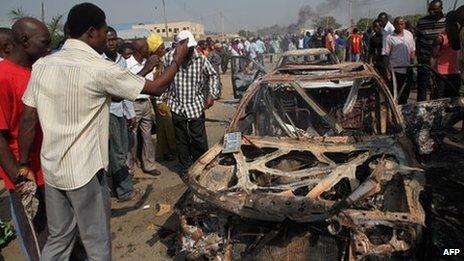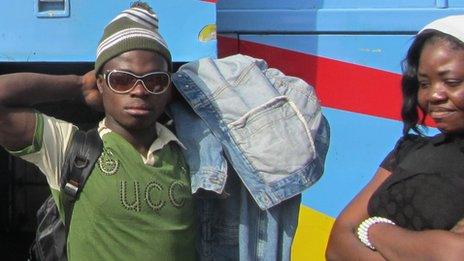Nigerian laureate Wole Soyinka lashes out
- Published
- comments

Boko Haram's escalating violence could threaten the very core of Nigeria
Even by Nigeria's raucous standards, it has been a frenzied few weeks here - a resilient nation galvanised by mass protests against the removal of fuel subsidies, and wrenched apart by the increasingly violent actions of the Islamist militant group, Boko Haram.
On a steamy morning in Lagos this week, I went to see Nigeria's Nobel laureate Wole Soyinka - a man who manages to be simultaneously irascible and avuncular - to get his perspective.
"I ceased using words like optimism and pessimism a long time ago," he warned me.
He had been giving a speech to a room full of uniformed Lagos students on the subject of human rights, during which he sought to contrast the twin, and sometimes fiercely contradictory, demands of peace and justice.
"The human hankering for equity," he called it with a nod to the mass protests that engulfed the country this month after President Goodluck Jonathan doubled - then almost un-doubled - most people's shopping bills overnight.
Like any sensible commentator on Nigeria, Mr Soyinka refused to buy into some grand scheme of success or failure.
He lashed out liberally - at the "madness" of Boko Haram's escalating "secessionist" violence and the "very real risk of disintegration" now threatening the nation.
"The government has got to take some very drastic action to contain this," he said, stressing the increasingly international dimension to "a very well-organised insurrection".
He was equally harsh on Nigeria's lavishly overpaid legislators: "We're being eviscerated by the maintenance of a top-heavy constitution… that breeds corruption" and a "warped and unworkable" centralised presidential system.
Instead of a cacophony of "monologues, we need to call for a national dialogue", he said.
Concerted move for change
But with the same breath, Mr Soyinka was celebrating the success of the recent fuel subsidy protests that forced President Jonathan to make a humiliating reversal.
"What we saw last week was not a process of disintegration. It strengthened society.
"Very few people have seen Nigerian people on the move like that - not asking for a change of government - just asking for equity, asking for the strengthening of economic and social justice.
"Sure it will [make a difference]. Government will see that society can mobilise - we've seen a concerted move for change."
Over the past week, in the slums and the suburbs of Lagos, from diplomats and businessmen, and in mosques and churches in the north of Nigeria, I have heard a similar, ambiguous chorus of fury, elation and uncertainty.
Nobody seems to believe things are beyond repair, but few buy into the simplistic notion of "Africa Rising" that so many Western investment firms are furiously peddling.
I will write more in the coming days - in the meantime I am signing off from a super-fast 3G connection in the back of a car trapped in one of Lagos's still notorious traffic jams, after spending a fascinating morning with the legendary musician and activist Femi Kuti.
- Published22 January 2012
- Published13 January 2012
